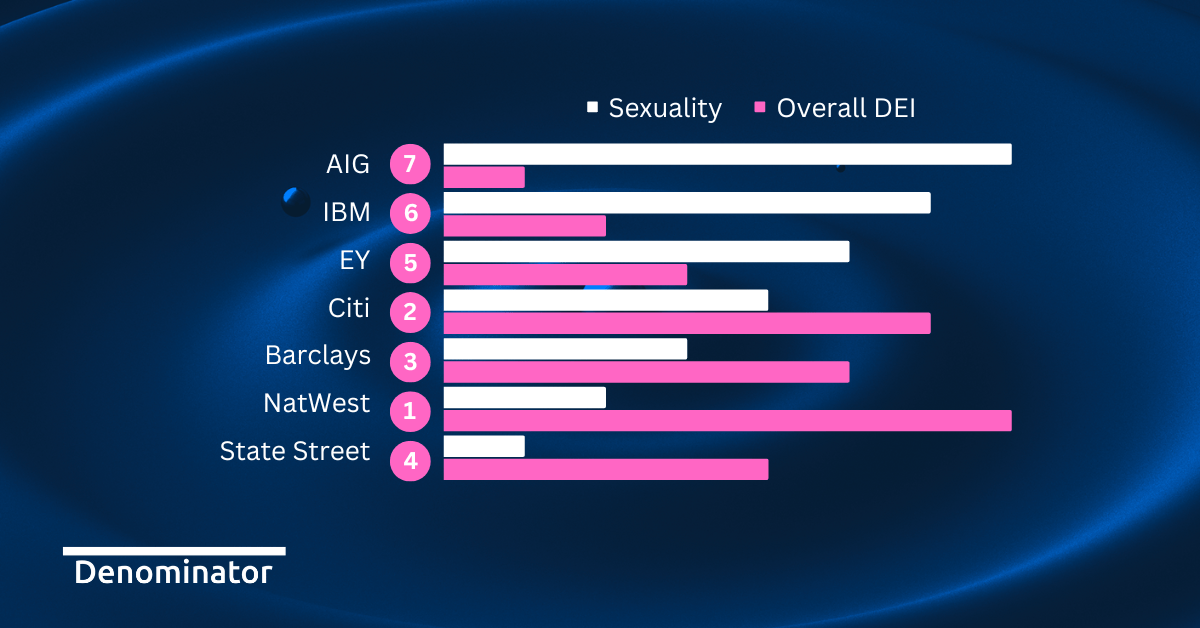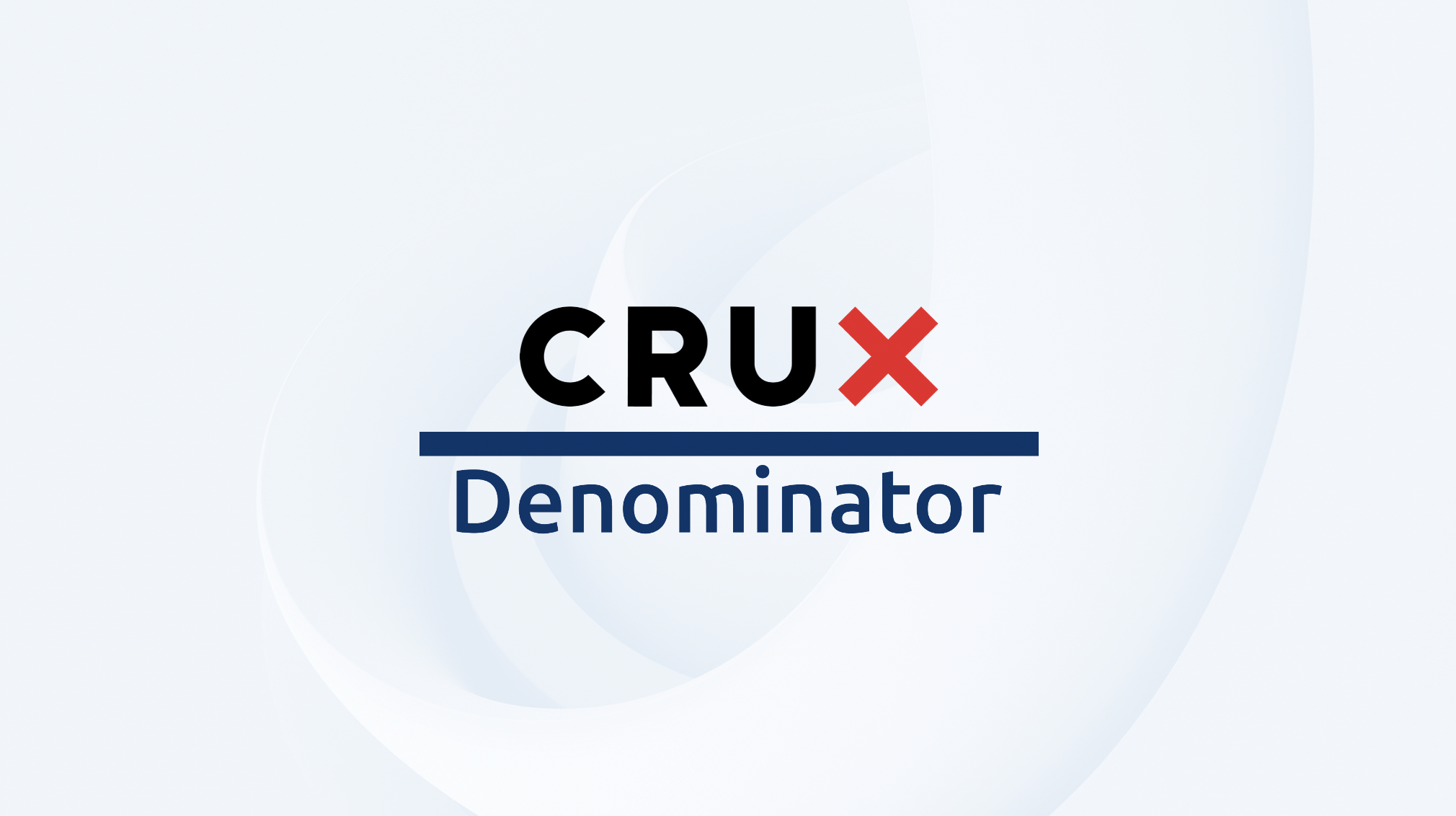As a company dedicated to facilitating DEI decisions through DEI data, Denominator is always interested in initiatives that use data to further their DEI objectives. One of those DEI initiatives is the use of Self-ID (Self-Identification) data.
Stonewall, an organization focused on LGBTQ+ rights, created a guide titled “DO ASK, DO TELL: Capturing Data on Sexual Orientation and Gender Identity Globally.” This is a guide dedicated to organizations seeking guidance on collecting data on LGBTQ+ employees; An often sensitive yet crucial task.
The promotion of Self-ID data serves to facilitate the recognition of barriers and opportunities for targeted initiatives aimed at improving the workplace for LGBTQ+ employees. The benefits of gathering LGBTQ+ data includes; gaining a better understanding of the workforce, implementing evidence-based initiatives, enhancing credibility, demonstrating support for LGBTQ+ employees, as well as addressing local needs.
To showcase various approaches taken by organizations in addressing this challenge, the Stonewall guide spotlights 7 companies that have made noteworthy progress in their LGBTQ+ initiatives by using Self-ID data. These companies include American International Group (AIG), Barclays, Citigroup (Citi), Ernst & Young (EY), International Business Machines (IBM), State Street Corporation and Royal Bank of Scotland (RBS), now known as NatWest.
Denominator’s DEI Data x 7 Companies Using LGBTQ+ Self-ID
Since the companies have implemented Self-ID, to progress on their LGBTQ+ DEI initiatives, it is interesting to explore how they perform compared to Denominator’s DEI ratings and scores.

Denominator’s DEI scores range from 0-100 with 100 being the highest performance. All scores are also transformed into objective DEI ratings. These range from C* (companies with the lowest DEI performance) to A*** (companies with the highest DEI performance). To learn more about Denominator’s DEI ratings and scores, please reach out at info@denominator.one.
The analysis has as its primarily focus, Sexuality (Denominator’s LGBTQ+ dimension) as the main anchor. This dimension is then compared against other DEI dimensions such as Gender, Race/Ethnicity, as well as Overall DEI. It is also worthy to note that the following rankings are between the 7 companies and not an illustration of the top performers across all Denominator’s data.
The first table in the analysis shows Denominator’s absolute ratings for each of the 7 companies using LGBTQ+ Self-ID.
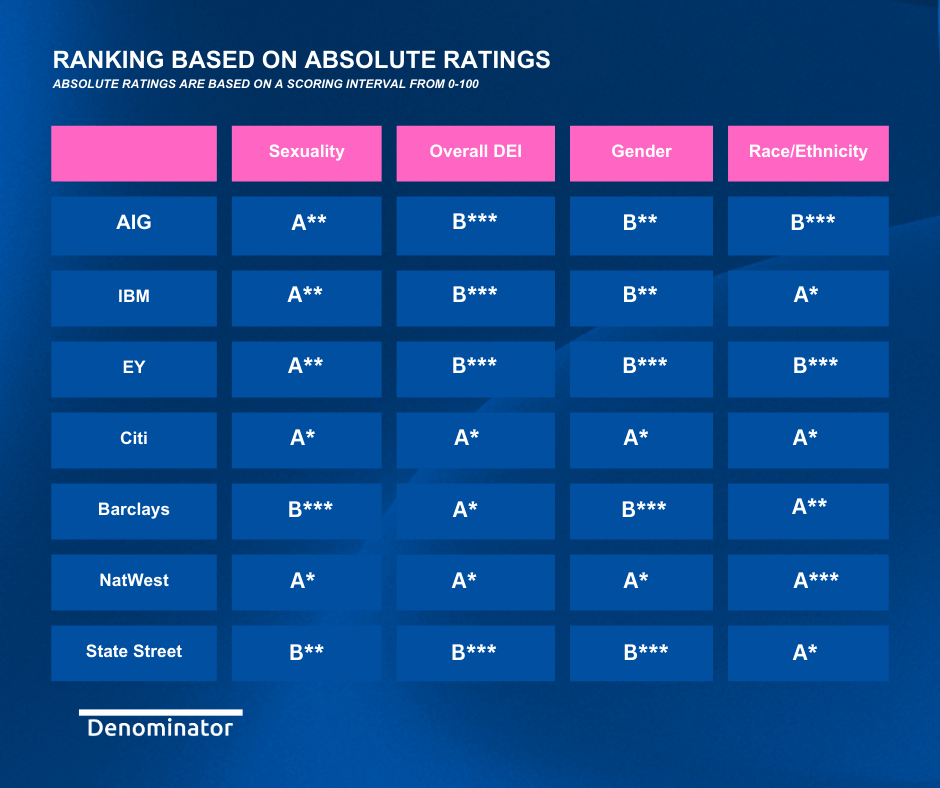
Each of the 7 companies achieves a medium to high rating for their absolute performance on Sexuality. Furthermore, when it comes to Overall DEI performance, all the companies achieve ratings ranging from medium to high performances.
AIG has one of the highest ratings on Sexuality, but only has a medium rating on the Overall DEI dimension. Barclays has a comparatively lower rating on Sexuality, but higher performance on Overall DEI and Race/Ethnicity. This highlights the importance of having a holistic approach to DEI, as correlation between different DEI dimensions cannot be guaranteed.
Among the 7 companies, NatWest and Citi have the most consistent ratings across all four dimensions: Sexuality, Gender, Race/Ethnicity, and Overall DEI.
The second table in the analysis, showcases Denominator’s relative ratings for each of the 7 companies using LGBTQ+ Self-ID.
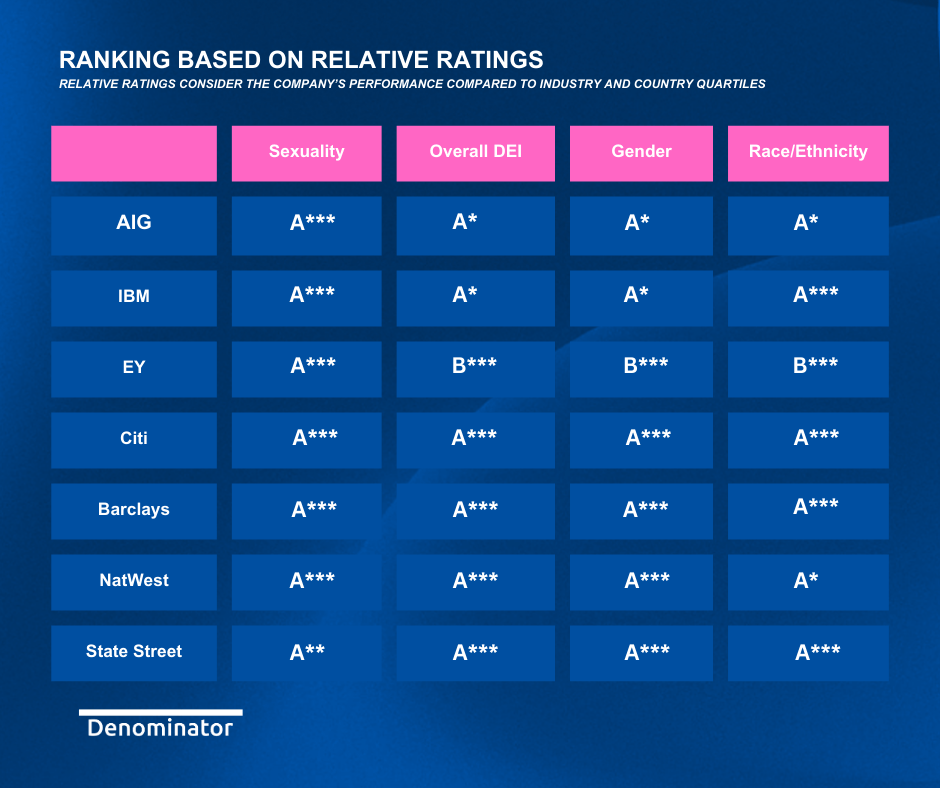
Assessing the companies’ relative ratings, Citi once again, now joined by Barclays, manages to consistently attain similar and high performances across all dimensions, joined closely by State Street and NatWest. Additionally, when benchmarking within their respective industries and countries, 6 out of the 7 companies consistently demonstrate strong performances in the dimensions of Overall DEI, Gender, Race/Ethnicity, as well as Sexuality. EY, however, has a lower relative rating on 3 of the DEI dimensions, when compared to the performances of similar companies in the same country.
However, all 7 companies attain high Sexuality performances compared to their respective industries and countries standards, which might be related to their Self-ID efforts and dedicated focus on this particular DEI dimension.
Analyzing DEI Dimensions in Relation to Sexuality: A Closer Look
To further explore the correlation between Sexuality and the 3 other DEI dimensions, the following graphs below compare performances of each dimension to the Sexuality performance. Sexuality is represented by the consistent white bar in all 3 graphs and the other 3 dimensions are represented by the changing pink bubbles, where 1 is defined as the highest performance. The rankings are still based on scores from 0-100.
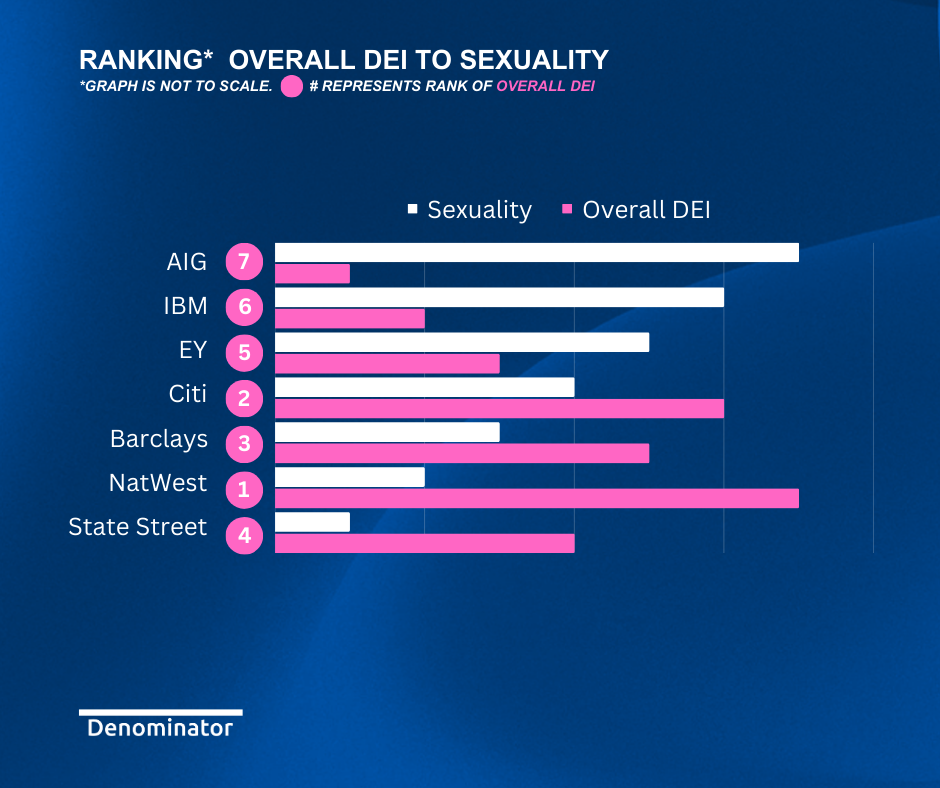
In terms of Overall DEI among the 7 companies, NatWest is ranked as the best performer, but second lowest performance on Sexuality. AIG and IBM are the two top performers on Sexuality, but last and second last performers on Overall DEI. There seems to be an inverted correlation between Sexuality and Overall DEI.
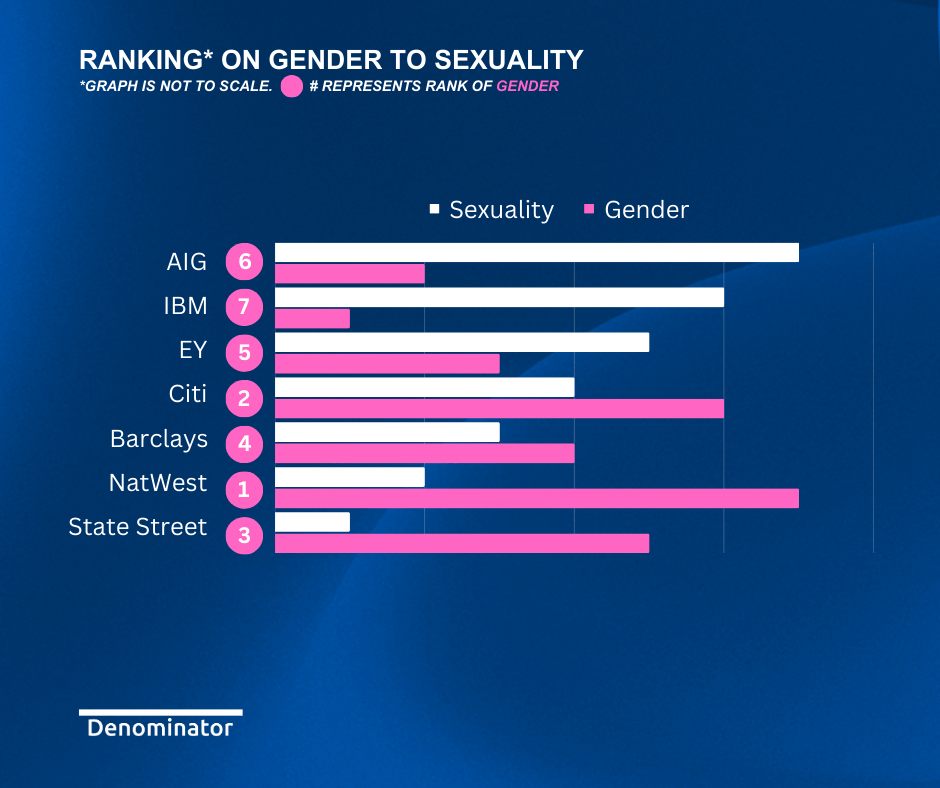
When considering the dimension of Gender, NatWest has the highest rank, closely followed by Citi. State Street comes in 3rd on Gender, even though compared to the other 6, they rank on the lower end regarding Sexuality.
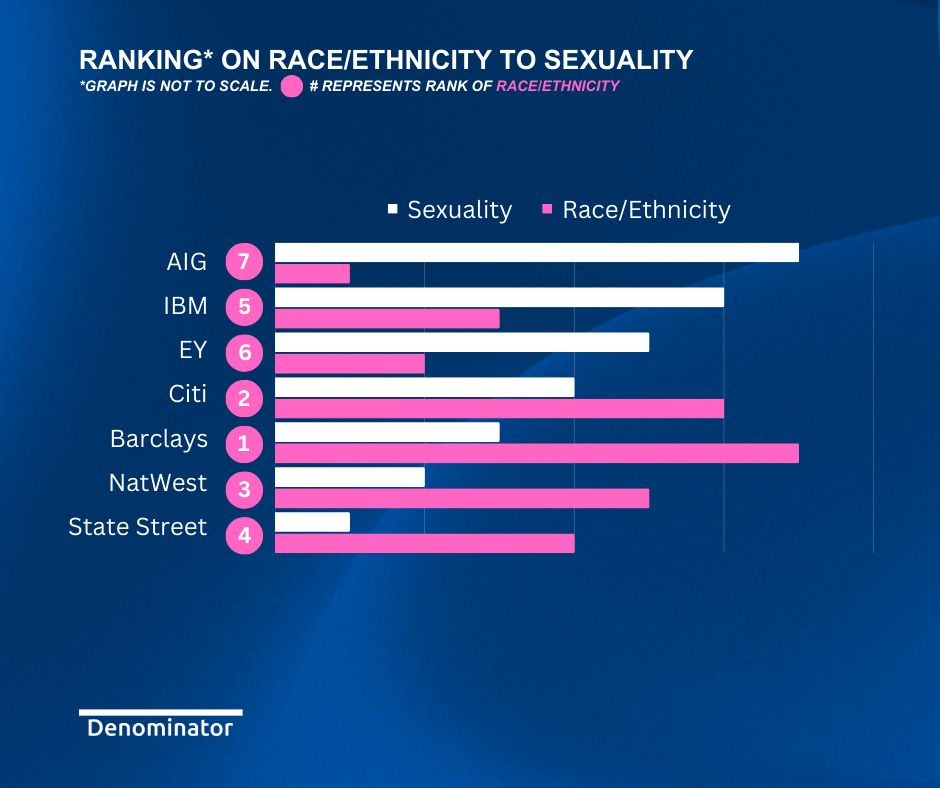
For Race/Ethnicity, Barclays scores the highest and is closely followed by Citi, while AIG also performs on the lower end of this DEI dimension.
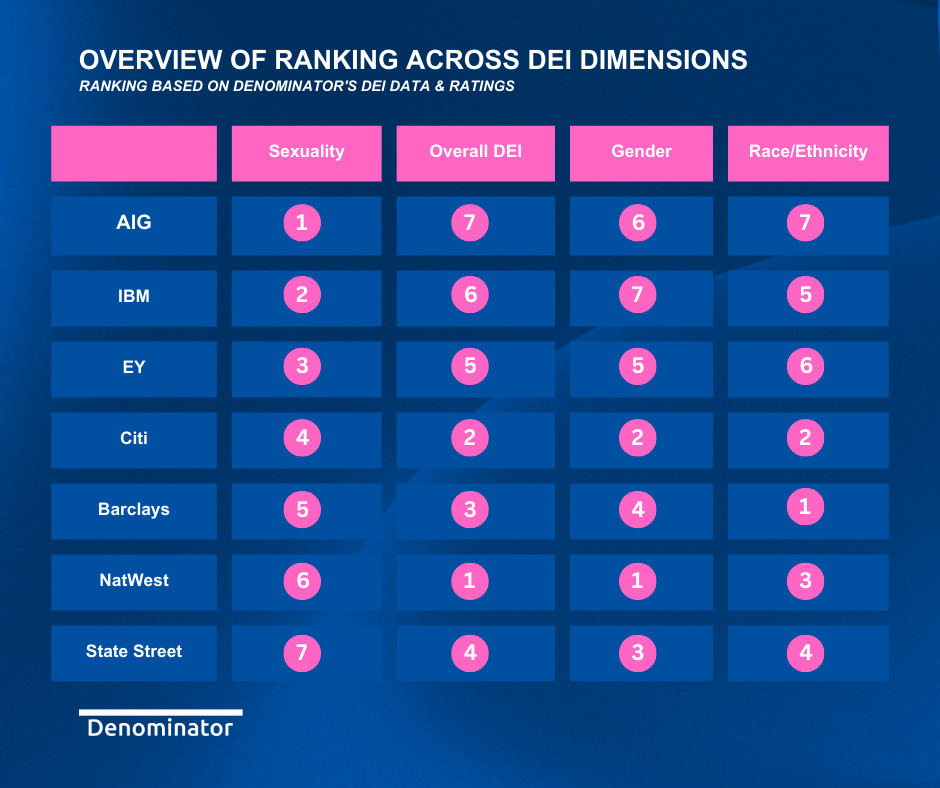
Note: Companies are ranked (in the pink bubbles) from 1-7, 1 being the best performer.
The last graph is an overview of all 7 companies’ rankings across the 4 DEI dimensions. The overview of the 7 companies, while representing a small sample of companies and DEI dimensions, highlights how DEI performance is not one-dimensional and that it is not always sufficient to analyze just one DEI dimension when assessing a company’s DEI performance.
While companies that perform well in Overall DEI tend to have better performances in several other DEI dimensions, it is still valuable to have insights into each individual dimension’s performance. As illustrated within this smaller sample, being top performers in Overall DEI does not inherently guarantee consistent high performances across all other DEI dimensions in a company.
Conclusion
All the 7 companies featured in Stonewall’s guide, recognized for their commitment to using LGBTQ+ Self-ID, to improve the success of their LGBTQ+ initiatives, have a high performance on Sexuality according to Denominator’s scores and ratings. Their high performance on the dimension of Sexuality, remains consistent even when taking their respective industries and countries’ performances into account.
However, high performances, specifically in the dimension of Sexuality, does not necessarily mean high performances within other DEI dimensions, such as in this example; Gender or Race/Ethnicity.
This highlights the importance of measuring DEI across all 15+ dimensions to provide a wider understanding of the overall DEI performance of a company. This not only grants a more holistic overview of DEI, but also provides the opportunity to dive deeper into specific and unique DEI dimensions as needed.
At Denominator, DEI Data is intended to assist organizations with their DEI initiatives and goals, by providing quantifiable and standardized DEI data on 15+ DEI dimensions. This paves the way for easier benchmarking, decision-making and internal reporting, providing valuable insights for strategic DEI progress and successful DEI initiatives.
For comprehensive DEI data and insights to assist your DEI goals, commitments, and initiatives, do not hesitate to contact us at info@denominator.one.
To learn more about Denominator’s DEI Data solutions, click here.
